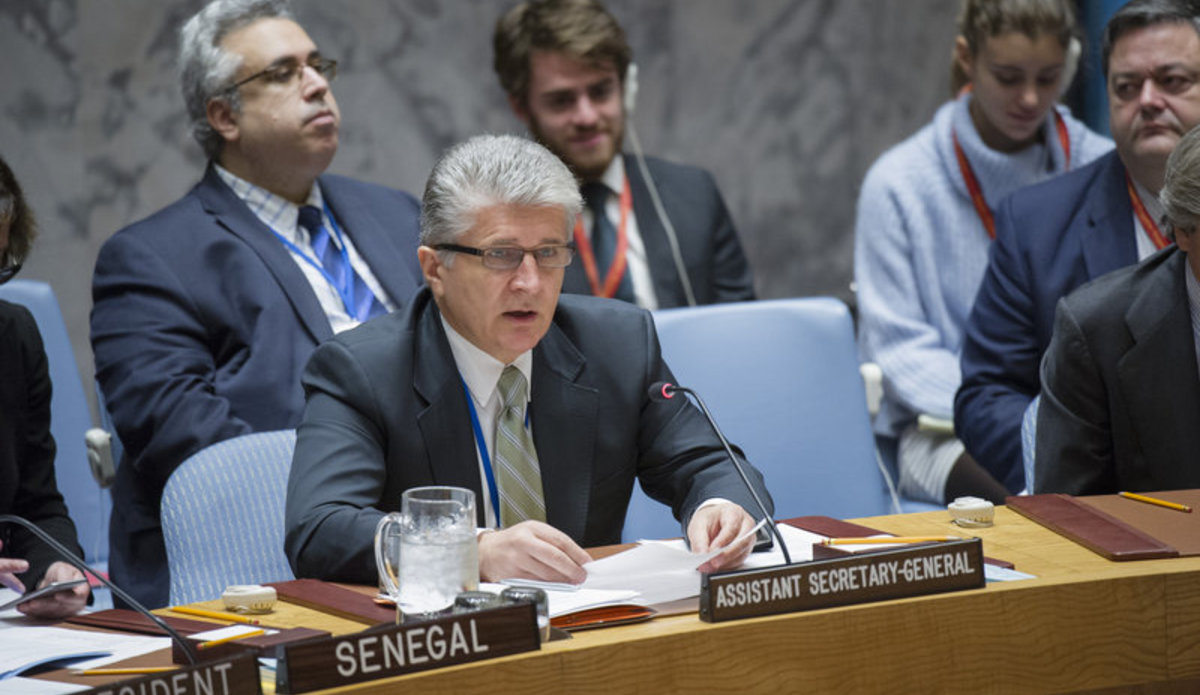Mr. President,
In its resolution 2202, unanimously adopted on 17 February 2015, this Council endorsed the “Package of Measures for the Implementation of the Minsk Agreements”, calling on all parties to fully implement the Measures, including a much-needed comprehensive and lasting ceasefire. In its Presidential statement of 6 June 2018, this Council again unanimously reaffirmed the centrality of the Minsk Agreements.
Four years after their adoption, the Minsk Agreements remain the only agreed framework for a negotiated peace in eastern Ukraine. While diplomatic efforts within the Minsk framework continue, the Minsk provisions regrettably remain largely unimplemented, including its key security and political aspects. Negotiations appear to have lost momentum, with the main stakeholders either unable and/or unwilling to reach an agreement on the key steps forward or being distracted from focusing on the implementation of agreed steps.
I would like to recall that detailed discussions on the implementation of the provisions of the Minsk Agreements have been taking place in separate fora, in which the United Nations is not a participant. The Secretary-General has been consistent in stressing the United Nations’ strong support for the lead role of the Normandy Four, the Trilateral Contact Group, the OSCE and other key actors to find a peaceful settlement of the conflict in eastern Ukraine. The Secretary-General has also repeatedly called for revitalising efforts in these negotiation formats and bilateral channels.
Mr. President,
As consistently highlighted by incidents over the past five years, the conflict in eastern Ukraine is neither dormant, nor frozen. It is a conflict in the heart of Europe which continues to claim victims.
With the five recommitments to the ceasefire by the main stakeholders in the Trilateral Contact Group format last year there is a total of over a dozen such ceasefire recommitments since the start of the conflict. Each one was regrettably, short-lived.
As reported by the OSCE, military advance positions on both parts of the contact line are coming closer to each other’s in the so called “grey areas” while the use of heavy weapons and their deployment in the proximity of the contact line, is a reality.
This week, another round of discussions within the Trilateral Contact Group will be taking place in Minsk. It is the UN’s sincere hope and expectation that relevant parties reach tangible outcomes at these meetings and implement decisions in good faith, and without delay.
Mr. President,
While there has been an overall reduction of violence since 2014, including in the number of civilian deaths, casualties and destruction continue on almost a weekly basis. At the same time, an estimated 1.5 million people remain internally displaced.
The periodic escalations remind us of the unstable reality along the contact line that continues to adversely impact the already dire socio-economic situation and the crumbling infrastructure in the conflict-affected area. There is an urgent need to agree on the additional measures that would make the ceasefire sustainable and irreversible. Without delay, the priority of the parties should be to withdraw heavy weapons from populated areas, disengage forces and protect critical civilian infrastructure.
Mr. President,
The United Nations remains fully committed to playing its role to continue to provide humanitarian assistance, human rights monitoring and development support. The scale and urgency of needs stemming from the conflict remain immense.
Over half a million people are living within five kilometres of the contact line and they are the most exposed to periodic shelling, gunfire, landmines and unexploded ordnance. The area around the contact line remains among the most mine-contaminated areas in the world.
As called for by this Council in its Presidential Statement of 6 June last year, it is essential that the international community steps up efforts to help meet the humanitarian needs on the ground as part of the Humanitarian Response Plan for Ukraine.
The United Nations will continue to spare no effort to fulfil its responsibilities in the delivery of humanitarian assistance and the monitoring of human rights. However, I wish to underline that it is also essential that the UN’s humanitarian efforts on the ground are not politicized or instrumentalized by any side.
Mr. President,
This year, the conflict in eastern Ukraine will be entering its sixth year. There should be no illusion today that while negotiations may have become protracted, this conflict remains an active threat to international peace and security. And it would be misleading to think that time by itself will bring about solutions.
On this occasion, and, echoing the Security Council’s expectations, the United Nations once again calls for swift progress in the implementation of the Minsk Agreements.
The United Nations also urges all parties to avoid any unilateral steps that could deepen the divide or depart from the spirit and the letter of the Minsk Agreements.
The conflict in Ukraine is first and foremost tragically affecting the Ukrainian people. But it also takes place in a context of increasing challenges to the international peace and security framework. The conflict continues to test the credibility of international and regional organizations.
In his address to this Council two years ago on conflicts in Europe, the Secretary-General stressed the need to prevent new crises and resolve existing conflicts in the region. Last month, in his New Year message to the General Assembly, the Secretary-General again singled out the conflict in Ukraine as one of the key challenges that continues to confront the international community. Member States need to work together in the interest of regional stability.
The United Nations underlines the need to fully respect the sovereignty and territorial integrity of Ukraine, within its internationally recognized borders, in accordance with relevant General Assembly and Security Council resolutions.
Once again, we urge all parties to demonstrate the necessary political will to ensure the earliest possible end to the conflict and help bring about peace and stability in all of Ukraine.
Thank you.

